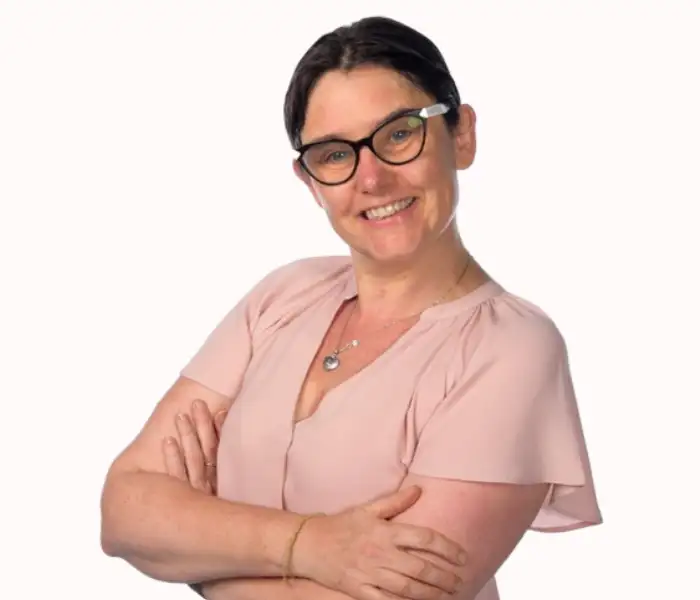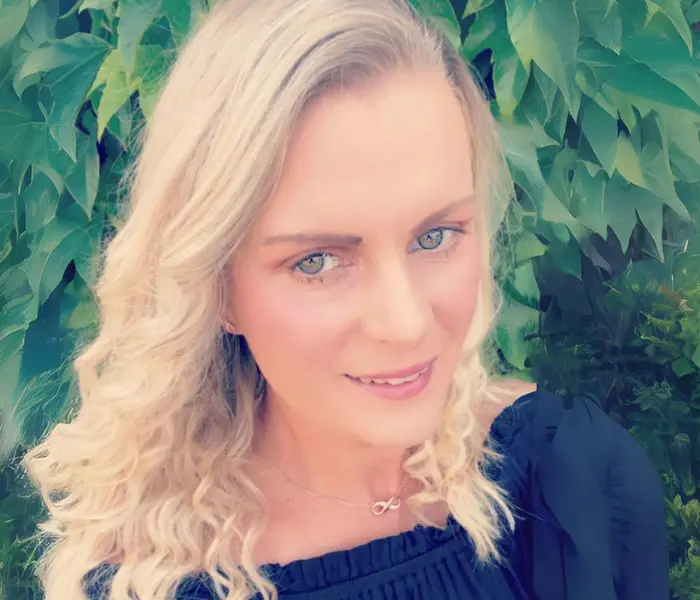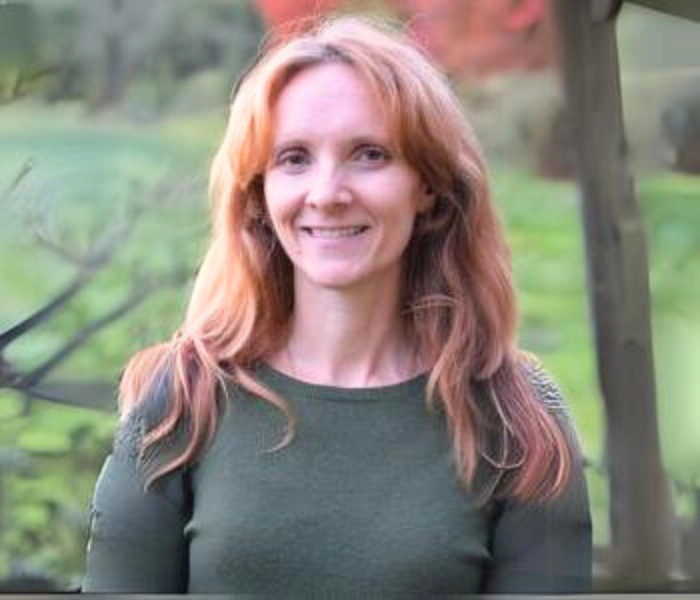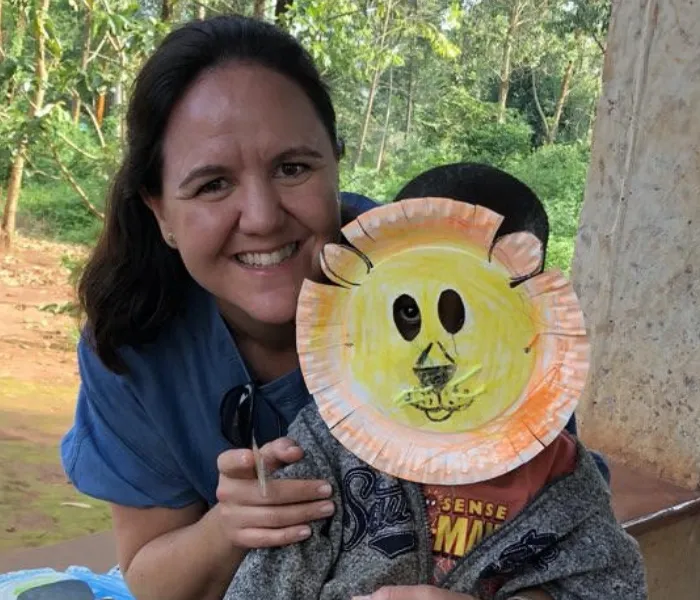Stephanie Evans – Masters in SEND and Inclusion | Certificate of Competence in Educational Testing | Psychology for Education | Social and Emotional Mental Health Needs
Stephanie Evans completed her Masters in SEND and Inclusion with us while she was a SENCO at Bangkok Patana School in Thailand. She has recently returned to the UK and is taking a career break to look after her young family.
After gaining her QTS in England, Stephanie moved to Thailand to become a Business Studies Teacher. She progressed to become Head of Sixth Form and took an interest in pastoral support. Shortly afterwards her Principal approached her and asked if she wanted to take up the role of school SENCo.
Stephanie realised that building her assessment skills would be an immediate requirement – when a gap in the team left them without a qualified assessor. She studied our CCET (Certificate of Competence in Educational Testing) module before going on to do our Access Arrangements Update course, Psychology for Education and Social and Emotional Mental Health Needs modules.
Her research project investigated whether offering the BTEC would be advantageous to pupils with SEND in the Sixth form as an alternative option to the current International Baccalaureate. As a result of her research, the school is rolling out several BTECs this coming year, providing students with more choice of study options..
Stephanie had the following to say about her overall learning experience with us:
“Studying with Real Training has helped my career and my professional development immensely. I haven’t found anything else that comes close and everyone I speak to has said the same. If you’ve done any level of special needs qualifications – it’s with Real Training.“ Stephanie Evans – SENCO, Bangkok Patana School
Of our CCET course Stephanie commented:
“This was a logical starting point for me, but what surprised me was just how much I enjoyed the course! It was very rewarding to be able to look at the numbers and pinpoint exactly where (and why) a student might be struggling. Often it meant I could sit down with students who told me “I’m just not clever” and show them the numbers that proved they actually were – they just need support in the right areas.“
You can find out more about what she thought about gaining her master’s by watching the video below.
Colette Davis – Leadership of Inclusive Practice

Colette Davis is the Leader of Inclusion for Beacon Hill School in Hong Kong. Her school have 540 students on roll with 21 spaces for students with more moderate needs. Leading a team of three teachers and seven assistants, Colette and her team aim to help support children and teachers to remove barriers to learning.
She is working toward gaining her Masters with Real Training. Having completed the Leading Inclusive Practice 60 credit module, she has gone on to begin the Gender and Sexuality and Social, Emotional and Mental Health modules.
Colette’s specialist interest areas of SEND are: Mental Health, Wellbeing, and Autism. Having recently completed a mental health first aid course and previous training in social thinking as a way to support. We caught up with Colette to see how her studies with Real Training have been going.
What made you choose the Real Training course over other options?
The tutor support was excellent. I enjoyed the variety of coursework, including readings, videos, and practical work. It was great to be studying again and having more rigour and ownership of my professional development. I enjoyed the interactions with some of the other students and was particularly interested in those who were also in international settings.
How has the course helped make an impact at school?
The course has had a direct impact on the work we have been doing at school in terms of inclusion. In the last two years, we have redefined what inclusion means to us as a school and changed our model moving forward. This has involved whole-school reflection, professional learning, and intense professional development days.
The course has meant that our approach towards the leadership of this change project and the measurement of its impact has been much more intentional. The timing was perfect. The change project that I shared and unpacked for this module was just a small part of the larger change project that we were already leading.
The impact has extended beyond the school as we have also had an opportunity to share within our wider foundation and at two international conferences.
How has the course helped develop you as an educational professional and what do you hope to achieve with the new knowledge/skills in the future?
I am looking forward to continuing my studies and deepening my understanding of a broad range of topics linked to inclusion. There is a big move in my organisation towards recognising and respecting Diversity, Equality, and Inclusion, and I look forward to Real Training helping me to dig deeper into this.
I have also been reflecting on my personal qualities as a leader and how I might become more intentional and inclusive in my approach.
Sharon Drinkwater – Social, Emotional and Mental Health
Recently, Sharon Drinkwater completed the Social Emotional and Mental Health module from our MEd SEND programme. Working within an independent SEN school in North Lincolnshire, Sharon is an assistant SENCO and on the safeguarding team.
Her special areas of interest include; Autism and SEMH. We caught up with Sharon to find out how she got on studying with us.
What made you choose Real Training courses over other options?
I chose Real Training because it was flexible as it allowed me to complete the work in my own time.
What was your experience of learning with Real Training?
I found the course interesting and easy to engage with and the course material was set out well. My tutor Katie was extremely helpful and quick with communication, always sending supportive messages. I feel that the course material was informative, will be useful in day-to-day practice and in developing my professional practice and understanding.
How has the course helped make an impact at school?
During the course, I found the provision map and analysing practice to be most beneficial. Since the course, I have been able to use my knowledge in designing and implementing new SEMH interventions within my work setting.
How has the course helped develop you as an education professional and what do you hope to achieve with the new knowledge/skills in the future?
Professionally it has given me the confidence to look deeper at whole-school approaches. I will be looking to develop this further over the next academic year.
Sophia Beigon – Full MEd
Sophia Beigon is due to complete the final module of her MEd in SEND.
We met up with Sophia to discuss how she found her time studying with us and how the programme’s flexibility has helped her to manage to study, work and raising a family over the past 5 years.
How did you find out about Real Training?
The SENCO at my school was completing a course with Real Training and pointed me in their direction. At the time I was interested in becoming a SENCO myself, as inclusion within education has always been important to me. I knew that I wanted to give myself a deeper understanding of SEND and therefore began the MEd with Skills and Knowledge courses.
As my SEND knowledge and school experiences progressed, I decided to change my initial pathway and not pursue the NASENCO route. Instead, I decided to focus on other MEd modules which would better complement my developing role in my school.
Why Real Training over other providers?
The fact that Real Training had a base in my area definitely made me feel a little less wary about the idea of an online learning experience. The affiliation with Middlesex also left a positive impression on me along with the high standards that were clear from my colleague’s recommendation. The courses looked interesting, well organised and challenging. Despite the fact that it’s not a face-to-face university experience, the high-quality standard of learning is most definitely still there. Real Training is a very professional and well set up provider.
What was your first experience of learning with Real Training?
I would not have considered Real Training if it wasn’t so flexible and allowed the setting of your own timelines. I am a working mother of two fantastic youngsters and learning how to balance life has been important. I didn’t know what to expect from the modules but appreciated the array of resources and videos and other multimedia that complimented reading and writing tasks. I appreciated the vast amount of links to government documentation/legislation as this gave me an insight into the bigger educational picture – and how schools subsequently need to engage. I enjoy learning about ‘what works’ according to educational researchers and being able to apply this to my school setting.
Upskilling myself throughout the MEd has allowed me to reflect upon how I learn best, which has definitely affected my practice positively.
How have the courses helped make an impact at the school?
Our school SENCO kindly commented that, “Sophia has developed bespoke packages of learning for students working within our specialist resource provision for SpLD. This is underscored by her wide understanding of cognitive and SEMH considerations. Sophia has delivered valuable whole school training and has created initiatives at all three tiers of intervention.”
From my point of view, my learning has given me the confidence to go into school and create training for colleagues and initiatives with students that I know are evidence-based; I have found this to be particularly powerful. I now also know where to look for additional resources such as government documents, or which SEND-focussed websites are best to access. Some aspects of the courses call for negotiations with staff which can be quite challenging as I am in school part-time. However, they are always so beneficial when completed. My newly acquired skills and knowledge have equipped me with efficiency to introduce appropriate and budget-fitting initiatives into school, such as reading tests, guidelines for literacy and development of a bespoke resourced provision.
How have the courses helped develop you as an educational professional and what do you hope to achieve with the new knowledge/skills?
Thanks to the courses I have gained a greater understanding of my students – seeing them not as a reflection of one single aspect of their learning or behaviour, but rather understanding them holistically. Working to the strengths of my students, working ‘outside the box’ when it comes to helping them access their learning is something that I feel proud about.
Another important mindset that I have picked up through my studies is an improved understanding of seeing SENDs from a parental perspective. I hope that I am a better practitioner because of it; I certainly feel that it has helped my own parenting skills! I ultimately hope to help my school create a learning environment that allows all types of learners to feel included – that they feel that they can achieve wonderful things without needing to fit into a one-size-fits-all box.
How was your experience of online learning vs. your expectations?
Campus Online has been really easy to use, with useful and accessible resources, such as EBSCO. Alongside this, their strong IT team has been really useful for me as I am not the most technically savvy! TheTeam was always easy to reach and happy to help, which put me at ease. In regard to tutor support – I cannot fault my tutors. They provided a challenge and got back quickly with knowledge and solutions. I was initially concerned about all the communication solely over email, however, I soon became comfortable with this. Studying online did actually help me ensure the flexibility I wanted and allowed me to manage my personal life, work commitments and studies.
Which parts have you found most interesting?
I have really enjoyed the literature reviews; finding out about educational paradigms and psychologies. The action research element of the EPI was challenging given my situation, however, I enjoyed collecting the data and watching the tool I created in action within the classrooms. Pushing myself as an educational professional has been such a beneficial process, especially understanding the importance of a critical eye, multiple perspectives and the ability to challenge viewpoints. Thanks to my training I feel so much more knowledgeable.
What are your hopes and expectations for the enquiry module and the future?
I have a few ideas for my enquiry module, but nothing solid as yet! I would love to further investigate the links between movement/sport and how this impacts cognitive processes or SEMH considerations. I would also really like to investigate the effects of engaging parents more obviously in the learning projects of our children. It seems hard at the moment to narrow my thoughts down!
Jane Yeomans is my tutor for the Enquiry module however and I feel very confident that I am in good hands. I have done some pre-course reading and feel excited to start. After completing my Enquiry module and MEd, I will look to gain the SpLD Assessment Practicing Certificate so that I can assess for Dyslexia and Dyscalculia. I know that Real Training offers a route to gain this qualification.
Bonwen Brauteseth – iSENCO
Bronwen Brauteseth is currently an Inclusion Support Teacher working in Dubai. Her special interest in SEND include; Social, Emotional and Mental Health and Learning Difficulties.
She completed the International Award for SEN Coordination qualification with us in January 2020 and has since then enrolled on our Social Emotional and Mental Health module. This means Bronwen has 60 credits on our MEd SEND programme and is working toward another 30.
What made you choose the Real Training course over other options?
It gave me the option of studying and working at the same time, through distance learning. I found the opportunity of selecting course credits for an M.Ed programme was exactly what I was looking for.
What was your experience of learning with Real Training?
I initially found the academic reading and writing tasks overwhelming but after setting up a study timetable and getting into a routine, I found the layout of the course extremely helpful for building your work towards the larger written assignments. While the course work is a lot to get through, with discipline and a good support team, I was able to get through it all.
My tutor, Colette, was extremely helpful and encouraging. I found that being in regular contact with my tutor helped to keep me on track and accountable. Colette has been extremely supportive throughout my learning journey as well as giving me guidance on various questions I have had during the programme. Her feedback on assignments has not only improved my confidence in writing the longer assignments but she also included very practical guidelines for each assignment.
How has the course helped make an impact at school?
The course has given me the confidence to successfully implement interventions for students with SEND that are research-based and in doing so, I am able to support school-wide improvement targets. Leading the Teaching Assistants is a new role for me that was offered to me after completing the iSENCO course. By running regular training programmes on the various aspects of learning for students with SEND has allowed for further improvement of school-wide provision.
How has the course helped develop you as an educational professional and what do you hope to achieve with the new knowledge/skills in the future?
The course has helped me understand Inclusion and SEND provision in-depth and on practical levels, which has in turn given me the confidence to recommend and adjust school practices based on research as required. It has inspired me to implement new changes for the benefit of the students in need and supporting various staff members to better understand their role in supporting students with SEND. The course has given me the confidence to look at my leadership skills in a different light and challenge myself to continue my M.Ed studies.
I found the practical assignments were extremely helpful in developing professional and reflective skills while the longer research assignments developed knowledge and a deeper understanding of the topics. Tasks with conversations with colleagues were helpful for guiding and improving practice.
Priya Shah – MEd SEND and Inclusion
Priyadarshana completed her BSc (Hons) Psychology in the UK in 1993 and has been teaching for nearly thirty years.
She started off working in secondary mathematics in a private British community school in Kenya and was also their dedicated SENCO. In 2005, Priya joined another school in Kenya and currently works as a high school maths teacher and learning support teacher.
Priya Shah has recently completed her MEd SEND and Inclusion and told us what it was like to study with us.
What does graduating with your master’s degree mean to you on a personal and a professional level?
Acquiring an MEd in SEND and Inclusion after twenty two years as a teacher has really raised my confidence in general. The applications have been diverse; from being able to critically analyse information, to gaining the skills to write professional reports to carrying out action research and listening to all perspectives around an idea or argument.
What made you choose the Real Training courses over other options?
I was looking to gain membership on Register for Qualified Test Users (RQTU) with the British Psychological Society (BPS). I found the CPT3A course online. As I work overseas, Real Training offered a user-friendly online platform and the turn-around time for replies to emails or queries was very quick. I also found that all the tutors I had were educational psychologists which have a lot to offer in terms of knowledge, experience and wisdom. The school that I work in then approached me and encouraged me to continue courses to achieve a Masters. And so I did!
What was your experience of learning with Real Training?
The online platform was easy to use and the readings and videos were relevant to my work, thus the experience of learning was pleasant and interesting yet very rigorous. The amount of work to be done was not insignificant, but manageable once you get organised.
How have the courses helped make an impact at school?
I have used the skills of administering standardised tests and writing reports for external exam boards from the CPT3A course and more students have benefitted from exam access accommodations.
I have utilized the knowledge and skills from the NASENCO course for my role as the Learning Support Case Manager for grade 11 and 12 and as the untitled team leader of our Learning Support department. It’s improved the way I work with the Student Support Services Coordinator of the school as well as the grade level leaders who manage the Response to Intervention framework.
The Social, Emotional Learning course was a great learning experience and the knowledge gained has enhanced my skills as a teacher and advisor. It has been particularly useful in these unusual times of COVID-19 when we went virtual.
The Enquiry-based research module was excellent as I got exposure to action research and got to investigate the efficacy of an online math intervention in terms of raising mathematical resilience of students with needs in an international setting using the RADIO framework. This has helped me as a co-teacher in math classes.
How have the courses helped develop you as an educational professional and what do you hope to achieve with the new knowledge/skills in the future?
My personal goal next academic year is to develop Social Emotional Learning in all my work in school, especially as we return to the school building after a period of virtual learning. I have already started a virtual Meditation course for students for our optional summer school. As a lifelong learner, I am learning more and more about meditation and how it helps both professionally as a teacher and in my personal life as well.
How has the experience changed your view on continued professional development for your own career?
This experience has made me see that I can step out of my comfort zone in terms of professionally developing my own career. As all my tutors have been educational psychologists, I feel like I am ready to take the next step and pursue a doctorate in educational psychology. I completed my BSc (Hons) Psychology in the UK in 1993 and wanted to become an educational psychologist after that.
In those days one also had to have Qualified Teacher Status (QTS) and a minimum of 2 years of teaching before applying for a Masters in Educational Psychology. I became a teacher and loved it so much that I stuck to it for 22 years. Now things have changed. One does not need to be a qualified teacher to pursue a career as an educational psychologist in the UK but one does need some experience with working with children or young people and then one pursues a 3-year Doctorate in Educational Psychology. As I do not live in the UK anymore and have responsibilities of taking care of a family overseas, I cannot go to the UK to train as an educational psychologist at the moment. I have yet to find a rigorous blended online course to fit my needs.
My only wish now is that Real Training develops an online program that I can pursue to qualify as a working educational psychologist. If they do, I would have no hesitation in taking it up!





